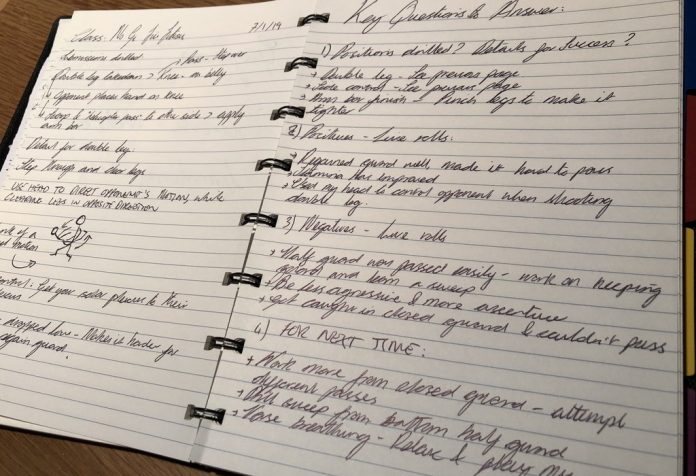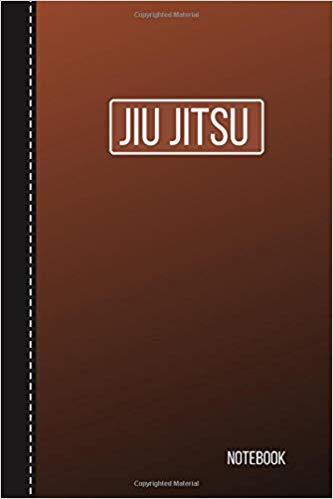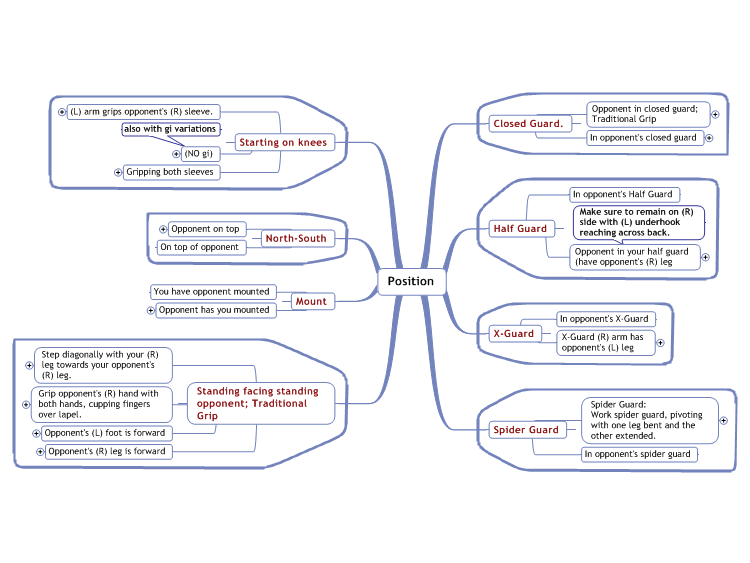
Brazilan JIu-Jitsu seems like everything happ[ens on the fly, with people just looking to snatch up a submission or hit a guard pass at every opportunity that arises. Playing a game like this is possible, but is far from optimal for reaching the higher levels of BJJ. Instead, what appears as utter chaos is actually very controlled and methodical. So much so, in fact, that people actually plan what they’ll do to a partner/opponent. The higher the level of BJJ, the more steps you can plan and make things seem effortless. However, when it comes to learning BJJ, people usually do not plan as much. Or, better said, they do not plan to retain as much knowledge as possible. And there’s an easy solution o it all – just get yourself a BJJ notebook.
For the longest time, I personally resisted the idea of having a BJJ notebook. I have no idea why, but I simply had lots of resistance towards writing stuff down. I just thought I’d remember it all, whether it was seminars, classes, online stuff, DVDs or something else. Well, it turns out BJJ doesn’t work that way. If you want to really figure things out you need to have an idea of what was told to you, so that you can elaborate on it later. And no matter how smart you think you are, you’ll forget stuff. Go to a multi-day BJJ camp if you do not believe me. To that extent, I jumped on the BJJ notebook bandwagon, and, as with many other things in grappling. I wish I had done so a white belt. If it is any consolation, it is never late to start writing down!
BJJ Nomenclature – A Whole Different Language
Learning BJJ is pretty much like learning another language. First up you have to learn the letters of the alphabet. That’s a white belt level. At blue belt, you learn how to coin together words. Purple is when the first sentences star-forming, and at brown belt, you can wire entire essays. This is when you find your own way of expressing yourself. Finally, as a black belt, you’ve got the entire knowledge of a language, from a grammatical standpoint and you just keep adding stuff to your already rich vocabulary. It is also the time when you start messing around with words, maybe even inventing new ones.

The first use of a BJJ notebook is to make sense of things. By things, I mean the vast Nomenclature of everything connected with BJJ, from technical stuff to BJ Jhprases and trends. Writing everything down will allow you not just to remember stuff, but also categorize them in a way that makes sense to you.
Another huge point I have to mention here has to do with competing in Jiu-Jitsu. Thre’s no better way to develop a gameplan than by writing down one. The best ideas usually come either during training or when you have a bit of time to yourself and can think about training. Keeping a BJJ notebook handy is a great way of putting your A-game to paper and gaining a different perspective of things.
A BJJ Notebook Is Not Just For Moves
Everything I said above is already obvious. Of course, you’ll write down BJJ moves’ names and gameplan tactics in a BJJ notebook. But that’s definitely not the end of it, not by a longs shot. After all, you can put anything on paper, and you can put it there in a bunch of ways.
here’s a crazy idea – why only write in a notebook, why not draw as well? What if you draw diagrams, or little figures or whatever it is that helps you connect the BJJ dots? A BJJ notebook si there to help you remember things, understand things and put them together. Everyone learns in a different way and for some people, drawing is an ultra-effective learning tool.
Next up, your BJJ notebook is not just the spot for technical stuff you pick up in class. Often times you go to seminars, or traveling instructors visit your gym. Some of them will surely share concepts more than they do techniques. Even though you might not be into concept and principle-based Jiu-Jitsu just yet, write them down. One day, these concepts will help you understand what exactly is going one when we slap and bump.
Ther’s also the possibility of writing down questions you’re not ready to really ask yet, or those that people around you can’t answer. For example, what if you have a No-Gi related question, but train in a Gi only gym? Write it down, one day either you will find the answer or someone will find it for you. While you’re at it, pout down every idea you might have that concerns BJJ, regardless of what it is, or how stupid it may sound.
How To Keep Track Of It All
Here’s a “radical” idea: use both sides of your BJJ notebook until you meet in the middle. Write down your technical notes as well as any game plan diagrams and drawings from front to back, for example. If you get a question, concept or idea, wor anything else that’s not technical, flip the notebook and write it down from back to front. That way, you can categorize stuff easily and locate them easily when you need them as well.

If you, however, decide to go paper-free, make sure you use a cloud-based system. That way, there’s at least a better chance that you won’t lose all your precious BJJ notes when the power goes out.
Summary
Finally, the most important point of them all – read what you write in your BJJ notebook. After all, the pint of writing stuff down is to be able to aces them later, right? Well, when you have the time, no matter how little it may be, pop your BJJ notebook out and start turning pages. there’s no need to read everything, just glance and peruse through it. Reading your notes constantly will do wonders for the way you remember and connect things. Time to pick up a notebook now, and head off to training.


![Darce Choke Encyclopedia – Origins, Mechanics and Variations [2025] BJJ, choke, Brabo, BJJ Darce Choke, D'arce Choke, Darce BJJ Choke](https://bjj-world.com/wp-content/uploads/2017/11/JungPoirierLeeYahoo-218x150.jpg)









![Jiu-Jitsu For Old Guys Guard Retention Bernardo Faria DVD Review [2025] Jiu-Jitsu For Old Guys Guard Retention Bernardo Faria DVD Review](https://bjj-world.com/wp-content/uploads/2025/03/old-guys-guard-retention-bernardo-faria-dvd-review-218x150.png)
![X-Guard Trickery Kyle Sleeman DVD Review [2025] X-Guard Trickery Kyle Sleeman DVD Review](https://bjj-world.com/wp-content/uploads/2025/03/x-guard-trickery-kyle-sleeman-dvd-review-218x150.png)
![Countering with Crab Ride Anthony Budion DVD Review [2025] Countering with Crab Ride Anthony Budion DVD Review](https://bjj-world.com/wp-content/uploads/2025/03/countering-with-crab-ride-anthony-budion-dvd-review-218x150.png)
![Closet Closed Guard Craig Jones DVD Review [2025] Closet Closed Guard Craig Jones DVD Review](https://bjj-world.com/wp-content/uploads/2025/03/closet-closed-guard-craig-jones-dvd-review-218x150.png)
![Xanadu Back Takes Levi Jones-Leary DVD Review [2025] Xanadu Back Takes Levi Jones-Leary DVD Review](https://bjj-world.com/wp-content/uploads/2025/03/xanadu-back-takes-levi-jones-leary-dvd-review-218x150.png)

![Higher Tripod Passing Craig Jones DVD Review [2025] Higher Tripod Passing Craig Jones DVD Review](https://bjj-world.com/wp-content/uploads/2025/02/higher-tripod-passing-craig-jones-dvd-review-324x235.png)



![Daisy Fresh WHITE BELT Wrestling Curriculum DVD Review [2024] Daisy Fresh WHITE BELT Wrestling Curriculum DVD Review](https://bjj-world.com/wp-content/uploads/2024/10/daisy-fresh-white-belt-wrestling-curriculum-review-100x70.png)
![Two Sides One Game Sweep and Pass Marcos Tinoco DVD Review [2024] Two Sides One Game Sweep and Pass Marcos Tinoco DVD Review](https://bjj-world.com/wp-content/uploads/2024/11/sweep-and-pass-marcos-tinoco-dvd-review-100x70.png)



![Reverse Arm Bar System Andrew Kerfoot DVD Review [2024] Reverse Arm Bar System Andrew Kerfoot DVD Review](https://bjj-world.com/wp-content/uploads/2024/10/reverse-arm-bar-system-andrew-kerfoot-dvd-review-100x70.png)

![I Got Your Back Jake Straus DVD Review [2025] I Got Your Back Jake Straus DVD Review](https://bjj-world.com/wp-content/uploads/2025/03/i-got-your-back-jake-straus-dvd-review-100x70.png)

![Total Domination Top Control Mariusz Domasat DVD Review [2024] Total Domination Top Control Mariusz Domasat DVD Review](https://bjj-world.com/wp-content/uploads/2024/09/domination-top-control-mariusz-domasat-dvd-review-100x70.png)

![The Rack Kyle Watson BJJ DVD Review [2025] The Rack Kyle Watson BJJ DVD Review](https://bjj-world.com/wp-content/uploads/2024/12/the-rack-kyle-watson-bjj-dvd-review-100x70.png)





![X-Guard Trickery Kyle Sleeman DVD Review [2025] X-Guard Trickery Kyle Sleeman DVD Review](https://bjj-world.com/wp-content/uploads/2025/03/x-guard-trickery-kyle-sleeman-dvd-review-100x70.png)



![Closed Guard Reintroduced Adam Wardzinski DVD Review [2025] Closed Guard Reintroduced Adam Wardzinski DVD Review](https://bjj-world.com/wp-content/uploads/2025/01/closed-guard-reintroduced-adam-wardzinski-dvd-review-100x70.png)
![Assassin Choke Baret Yoshida DVD Review [2024] Assassin Choke Baret Yoshida DVD Review](https://bjj-world.com/wp-content/uploads/2024/10/assassin-choke-baret-yoshida-dvd-review-100x70.png)
![Simplify the System Side Scissor Brian Glick DVD Review [2024] Simplify the System Side Scissor Brian Glick DVD Review](https://bjj-world.com/wp-content/uploads/2024/09/side-scissor-brian-glick-dvd-review-2024-100x70.png)
![Darces From Everywhere Kade and Tye Ruotolo DVD Review [2024] Darces From Everywhere Kade and Tye Ruotolo DVD Review](https://bjj-world.com/wp-content/uploads/2024/10/darces-from-everywhere-kade-and-tye-ruotolo-dvd-cover-100x70.png)
